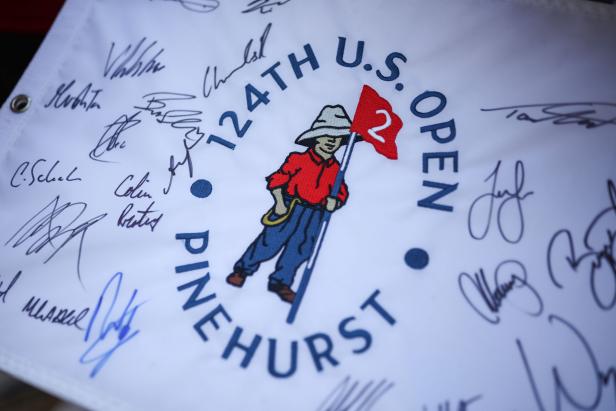Golf
Here’s how they determine the 36-hole cut at the U.S. Open

PINEHURST, N.C. — During the practice rounds ahead of the 2024 U.S. Open, the word “carnage” was being tossed about regarding what Pinehurst No. 2 might have in store for the 156 players in the field. Thursday’s first round didn’t prove quite as treacherous as forecasted, but it certainly looked a little more like a U.S. Open than in the recent past.
Recall a year ago at Los Angeles Country Club, there was a record scoring day with the field posting a 72.38 average to set the all-time record for the opening round in the national championship. In contrast, Pinehurst No. 2 sported a 73.25 average, with Rory McIlroy and Patrick Cantlay shooting five-under 65s to give themselves a one-stroke lead on Ludvig Aberg.
After a hot, relatively windless Thursday, the question is whether the Donald Ross gem will play more difficult during Friday’s second round and, if so, how will that impact the thing on many players’ minds: making the 36-hole cut.
Indeed, while players will be jockeying for position atop the leader board in hopes of eventually winning the championship come Sunday, many others will be simply trying to just make sure they’re still in North Carolina come the weekend.
Unlike the PGA Championship and the Open Championship, which allows the low 70 players and ties to play all four rounds, the USGA has a slightly higher bar for its “cut rule,” taking only the low 60 and ties. And there is no “10-stroke rule” in effect to help determine the U.S. Open cut; the USGA did away with it in 2011.
With 15 players posting under-par scores in the first round, the projected cutline from datagolf.com at the start of Friday was 42.1-percent probability of four-over-par 144. A year ago at LACC, the cut wound up falling at two-over 142, breaking the U.S. Open record for lowest cutline by one stroke previously set in 2003 at Olympia Fields and 2022 at The Country Club. Among the players who would be heading home if four over is the ultimate number are Justin Thomas, Viktor Hovland and Phil Mickelson, with Shane Lowry, Dustin Johnson, Keegan Bradley and Matt Fitzpatrick holding on with another 18 holes to go.
If you think just making the cut doesn’t mean much in determining the ultimate winner, we refer yet again to what happened six years ago at Shinnecock Hills. Tony Finau and Daniel Berger had made the 36-hole cut with one stroke to spare, but were 11 strokes off the lead when they teed off on Saturday morning in the third round. They each posted four-under 66s, and when the winds picked up in the afternoon—along with the scores—Finau and Berger found themselves tied for the lead after 54 holes. Finau would eventually finish fifth and Berger would come in tied for sixth, each securing spots into the 2019 championship with their weekend play. So yeah, even just making the cut is a big deal. (Oh, and they’re playing for a record $21.5 million in prize money, so getting to the weekend, even on the number, can be financially very lucrative, too.)
One of the other questions at the U.S. Open is also whether any of the 16 amateurs competing will make the cut. Four made the cut at year ago at LACC after three made it in 2022 and none played on the weekend in 2021, the first time that had happened since 2007.
Here’s what the cutline has been for the last 10 U.S. Opens:
2023: 142 (+2), Los Angeles Country Club
2022: 143 (+3), The Country Club
2021: 146 (+4), Torrey Pines
2020: 146 (+6), Winged Foot
2019: 144 (+2), Pebble Beach
2018: 148 (+8), Shinnecock Hills
2017: 145 (+1), Erin Hills
2016: 146 (+6), Oakmont
2015: 145 (+5), Chambers Bay
2014: 145 (+5), Pinehurst No. 2
And here’s what it’s been the three previous times it’s been played at Pinehurst:
2014: 145 (+5)
2005: 148 (+8)
1999: 147 (+7)
For history buffs, here are some stats related to the cut at the U.S. Open:
Highest 36-Hole Cut (Since World War II):
155 (15 over), The Olympic Club (Lake Course), San Francisco, Calif., 1955
154 (14 over), Southern Hills C.C., Tulsa, Okla., 1958
154 (10 over), Pebble Beach (Calif.) G.L., 1972
Lowest 36-Hole Cut
142 (+2), Los Angeles Country Club (North Course), 2023
143 (+3), Olympia Fields (Ill.) C.C. (North Course), 2003
143 (+3), The Country Club (Open Course), 2022
144 (+2), Pebble Beach (Calif.) G.L., 2019
144 (+4), Baltusrol G.C. (Lower Course), Springfield, N.J., 1993
144 (+4), Bethpage State Park (Black Course), Farmingdale, N.Y., 2009
145 (+1), Medinah (Ill.) C.C. (No. 3 Course), 1990
145 (+1), Erin Hills, Erin, Wis., 2017
145 (+5), Oakland Hills C.C. (South Course), Birmingham, Mich., 1985
145 (+5), Oak Hill C.C. (East Course), Rochester, N.Y., 1989
145 (+5), Shinnecock Hills G.C., Southampton, N.Y., 2004
145 (+5), Pinehurst R. & C.C. (No. 2), Village of Pinehurst, N.C., 2014
145 (+5), Chambers Bay, University Place, Wash., 2015
Most Players to Make Cut
108, Oakland Hills C.C. (South Course), Bloomfield Hills, Mich., 1996
88, Baltusrol G.C. (Lower Course), Springfield, N.J., 1993
Most U.S. Opens Completed, 72 Holes
35, Jack Nicklaus
27, Hale Irwin
27, Sam Snead
26, Raymond Floyd
26, Phil Mickelson
26, Gene Sarazen
25, Gary Player
25, Tom Watson
Youngest to Make Cut (since World War II)
17/3/0 Beau Hossler, 2012, T-29th
17/8/29 Michael Thorbjornsen, 2019, 79th
18/1/25 Bobby Clampett, 1978, T-30th
18/4/25 Jack Nicklaus, 1958, T-41st
18/9/3 Aldrich Potgeiter, 2023, 64th
Oldest to Make Cut
61 Sam Snead, 1973, T-29
60 Tom Watson, 2010, T-29
58 Jack Nicklaus, 1998, T-43










